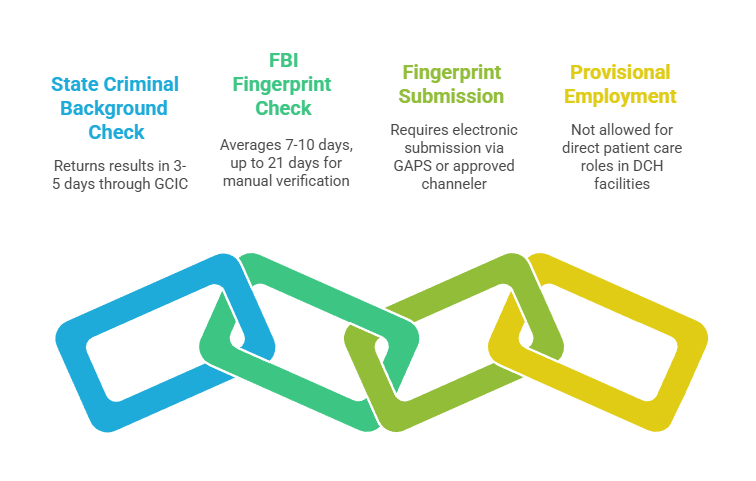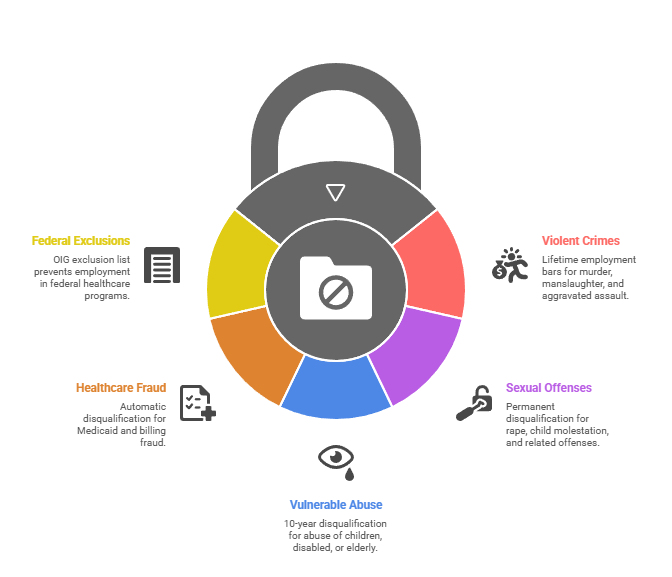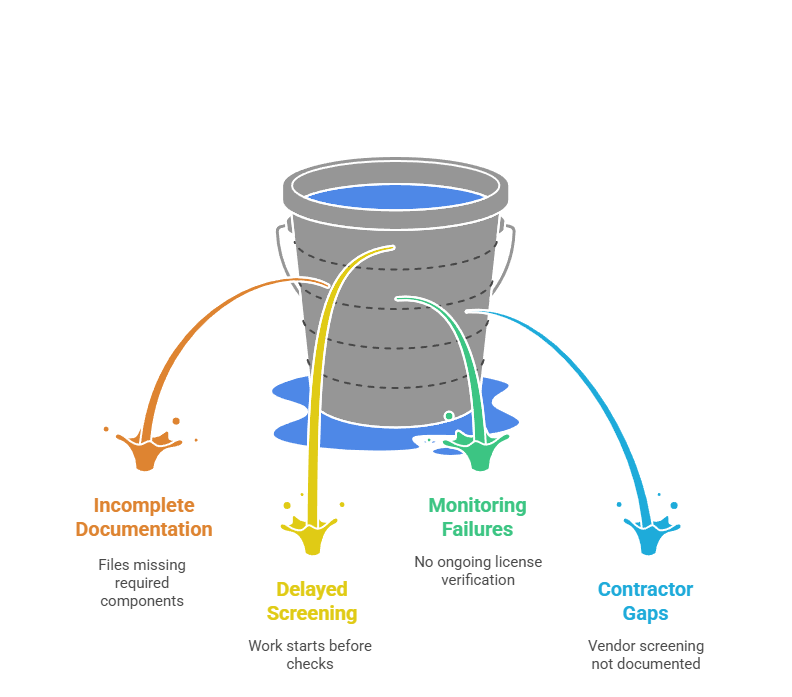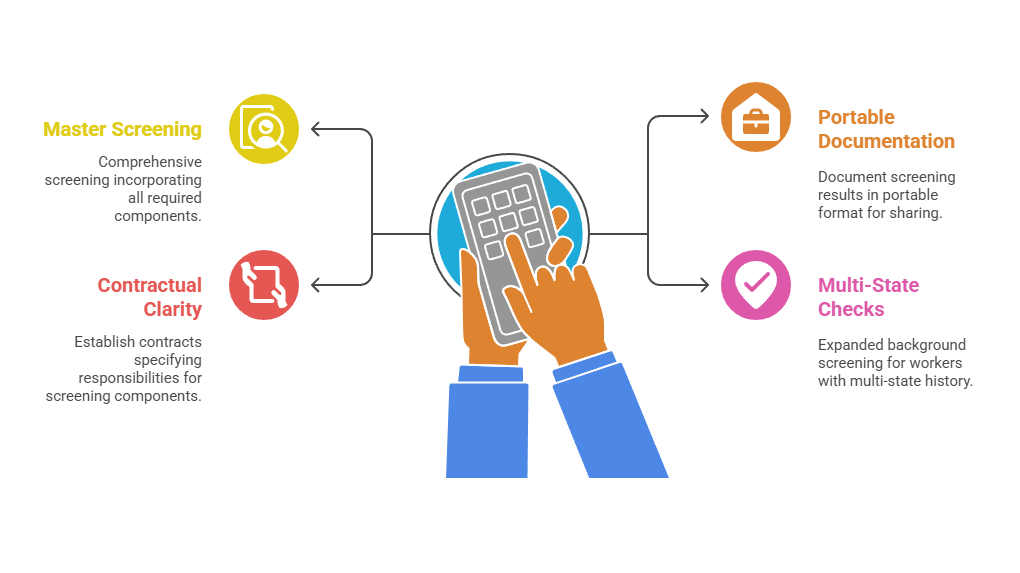Georgia healthcare facilities must navigate a complex, multi-jurisdictional background screening framework that varies significantly by facility type, role classification, and regulatory oversight—with DCH-regulated entities facing the most stringent requirements. This comprehensive guide provides HR managers and compliance officers with actionable timelines, facility-specific mandates, and remediation strategies to maintain both regulatory compliance and operational efficiency in 2025.
Key Takeaways
- Georgia healthcare worker background checks require multiple components including state and FBI fingerprint checks, OIG/GSA exclusion lists, abuse registry searches, and credential verification, with requirements varying by facility type and role.
- DCH-licensed facilities (hospitals, nursing homes, hospices) face the strictest screening mandates under O.C.G.A. § 31-7-350 through 31-7-354, requiring comprehensive background checks for all direct patient care staff and contractors.
- Processing timelines typically range from 5-14 business days for complete clearance, though FBI fingerprint results can extend to 21 days during peak hiring periods or if manual review is required.
- Automatic disqualifiers include convictions for specified violent crimes, sexual offenses, abuse/neglect, and healthcare fraud within lookback periods ranging from 5 years to lifetime depending on offense severity.
- Healthcare facilities must conduct continuous monitoring through monthly OIG/GSA list checks and ongoing credential verification rather than relying solely on initial pre-employment screening.
- Failed background checks can be remediated through Georgia's Rehabilitation Review Process (O.C.G.A. § 31-7-352), which allows candidates to present evidence of rehabilitation for certain non-automatic disqualifiers.
- DCH audits in 2024-2025 prioritize documentation completeness, timeliness of screening completion, and continuous monitoring compliance, with average fines ranging from $5,000-$25,000 for repeat violations.
- Staffing agencies supplying temporary healthcare workers must ensure compliance with the most stringent requirements of any client facility, creating additional screening complexity for multi-facility placements.
Understanding Georgia's Healthcare Background Screening Framework
Regulatory Jurisdictions and Oversight Bodies
Georgia healthcare worker background checks operate under a multi-agency framework that creates overlapping compliance requirements. The Georgia Department of Community Health (DCH) maintains primary regulatory authority over licensed healthcare facilities including hospitals, nursing homes, personal care homes, and hospices. Additionally, the Georgia Composite Medical Board oversees physician-specific credentialing, while the Georgia Department of Public Health (DPH) regulates home health agencies and certain community health programs.
This jurisdictional complexity means healthcare facilities often answer to multiple regulatory bodies simultaneously. Understanding which regulatory framework applies to each position within your facility is the critical first step in Georgia healthcare background screening compliance.
Facility Type Determines Screening Requirements
The type of healthcare facility dramatically impacts background check scope and stringency. DCH-licensed facilities under O.C.G.A. § 31-7-350 et seq. face the most comprehensive requirements, mandating criminal background checks, abuse registry searches, and exclusion list monitoring for virtually all staff with patient access. Long-term care facilities face particularly intense scrutiny, with DCH conducting targeted audits on nursing homes following the 2023 regulatory updates that expanded direct patient care definitions.
Ambulatory surgical centers, physician practice groups, and outpatient clinics not directly licensed by DCH may have more flexibility in establishing screening protocols. However, they still must comply with professional licensing board requirements and CMS standards if accepting federal reimbursement. Georgia healthcare facilities must document their determination of applicable requirements based on facility licensure, accreditation status, and reimbursement sources.
Georgia Healthcare Worker Background Check Components
Criminal History Checks: State and Federal Requirements
Georgia healthcare facilities must obtain both state and FBI fingerprint-based criminal history checks for covered positions. The Georgia Crime Information Center (GCIC) processes state-level criminal records, while FBI checks provide nationwide coverage including records from other states and federal jurisdictions.
Background check processing follows predictable timelines that impact hiring workflows:

- State Criminal Background Check: Typically returns results within 3-5 business days through GCIC processing.
- FBI Fingerprint Check: Averages 7-10 business days but can extend to 21 days if records require manual verification.
- Fingerprint Submission: Facilities must use Georgia's Applicant Processing Service (GAPS) or another approved channeler for electronic fingerprint submission.
- Provisional Employment: Georgia law does not permit provisional employment pending background check completion for positions involving direct patient care in DCH-regulated facilities.
For urgent hiring needs, this restriction frequently creates operational challenges during nursing shortages. Healthcare HR managers must plan hiring timelines accordingly to avoid compliance violations.
Healthcare-Specific Registries and Exclusion Lists
Beyond criminal history, Georgia healthcare worker background checks must include searches of specialized registries that identify individuals prohibited from healthcare employment. The OIG List of Excluded Individuals and Entities (LEIE) and the GSA System for Award Management (SAM) exclusion list are federally mandated for any facility receiving Medicare or Medicaid reimbursement.
| Registry Type | Purpose | Search Frequency |
| OIG LEIE | Federal healthcare exclusions | Monthly for all employees |
| GSA SAM | Government contracting exclusions | Monthly for all employees |
| Georgia Nurse Aide Registry | Abuse findings for CNAs | Pre-employment + ongoing |
| Georgia Sexual Offender Registry | Sexual offense convictions | Pre-employment required |
| Georgia Abuse and Neglect Registry | Healthcare setting abuse findings | Pre-employment required |
Employing an excluded individual can result in claim denials, mandatory refunds, and False Claims Act liability. Healthcare HR managers should implement monthly re-checks of OIG/GSA lists for all current employees, as exclusions can be added at any time and create immediate employment eligibility issues.
Professional License and Credential Verification
Healthcare facilities must verify that clinical staff hold current, unrestricted licenses in good standing. Georgia's healthcare license verification process requires checking primary source verification through the appropriate licensing board. Third-party verification services streamline this process but must still connect to primary sources rather than relying on candidate-provided documentation.
The verification process should confirm several critical elements. First, verify license number, issue and expiration dates, and license status (active, inactive, lapsed). Next, check for any disciplinary actions or restrictions on the license. Finally, determine whether the license is part of the Nurse Licensure Compact (NLC) for nursing staff. License verification typically adds 2-4 business days to the overall screening timeline depending on licensing board responsiveness.
Role-Based Screening Requirements in Georgia Healthcare

Direct Patient Care vs. Administrative Positions
Georgia distinguishes between positions involving "direct patient care" and those with minimal patient contact, applying different screening stringency accordingly. Direct patient care positions—defined as roles providing hands-on care, treatment, or services directly to patients—trigger the most comprehensive background check requirements under O.C.G.A. § 31-7-350.
Administrative and support positions without direct patient access typically require less extensive screening. A medical records clerk with access to protected health information requires a different screening focus (fraud, identity theft) than a facilities maintenance worker (violent crimes, theft). Healthcare facilities should maintain written policies defining which positions fall into each category and documenting the screening components required for each classification.
Contractors, Vendors, and Temporary Staff Considerations
Background screening requirements extend beyond direct employees to include contractors, vendors, and temporary staff with facility access. This creates particular complexity for healthcare staffing agencies supplying temporary nurses, therapists, or other clinical professionals to Georgia facilities. The supplying agency typically conducts the background check, but the healthcare facility retains ultimate responsibility for ensuring compliance with its specific requirements.
Best practice involves requiring staffing agencies to provide written documentation that their screening protocols meet or exceed the facility's requirements. For contracted services like environmental services, food service, or equipment maintenance, facilities must conduct background checks on any contractor with unsupervised patient access. Document these determinations in vendor contracts and maintain copies of contractor background check certifications for audit purposes.
Georgia Healthcare Background Check Disqualifiers
Automatic Disqualification Offenses
Georgia law establishes specific criminal convictions that create automatic, permanent disqualification from healthcare employment in DCH-regulated facilities. Healthcare facilities have no discretion to employ individuals with these convictions regardless of rehabilitation evidence, time elapsed, or role requirements.
Under O.C.G.A. § 31-7-351, automatic disqualifiers include:

- Violent Crimes: Murder, voluntary manslaughter, and aggravated assault convictions create lifetime employment bars.
- Sexual Offenses: Rape, child molestation, aggravated sodomy, and aggravated sexual battery result in permanent disqualification.
- Vulnerable Population Abuse: Convictions for abuse, neglect, or exploitation of children, disabled adults, or elderly adults within the past 10 years.
- Healthcare Fraud: Medicaid fraud and healthcare billing fraud convictions automatically disqualify individuals from positions involving billing, claims submission, or financial responsibilities.
- Federal Exclusions: The OIG exclusion list functions as a federal automatic disqualifier—facilities cannot employ excluded individuals in any capacity if they participate in federal healthcare programs.
Additional automatic disqualifiers extend beyond criminal convictions. These prohibitions protect vulnerable patient populations and preserve healthcare program integrity.
Reviewable Offenses and Lookback Periods
Beyond automatic disqualifiers, Georgia establishes reviewable offenses that may—but don't automatically—preclude healthcare employment. These include convictions for other felonies and misdemeanors involving violence, drugs, theft, or fraud within specified lookback periods. For most reviewable offenses, Georgia applies a 5-year lookback period from conviction date or release from incarceration (whichever is later).
The reviewable offense framework allows facilities to consider mitigating factors. Healthcare facilities should evaluate the nature and gravity of the offense, time elapsed since conviction, and evidence of rehabilitation. Additionally, consider the relation between the offense and job duties, plus the individual's employment history since the conviction. A decade-old simple battery conviction for a candidate seeking an environmental services position carries different risk implications than a recent drug diversion conviction for a nursing applicant.
Failed Background Checks and Remediation Process
When a Georgia healthcare worker background check reveals disqualifying information, facilities must follow specific procedures to protect both compliance and candidate rights. First, provide pre-adverse action notice to the candidate along with a copy of the background check report and a summary of rights under the Fair Credit Reporting Act (FCRA). This gives candidates an opportunity to dispute inaccurate information before final employment decisions.
For reviewable (non-automatic) disqualifiers, Georgia provides a Rehabilitation Review Process under O.C.G.A. § 31-7-352:
- Evidence Submission: Candidates can submit evidence of rehabilitation including completion of counseling or treatment programs, character references, and evidence of steady employment.
- Committee Review: The facility's compliance committee or designated reviewer evaluates this evidence using documented criteria to determine whether the candidate poses acceptable risk.
- Documentation Requirements: Maintain detailed documentation of the review process, factors considered, and rationale for the final decision.
This documentation becomes essential if DCH questions the hiring decision or if the candidate files a discrimination complaint. Consistent application of documented criteria protects facilities from both regulatory penalties and discrimination claims.
Processing Timelines and Operational Efficiency Strategies
Understanding realistic processing timelines helps healthcare facilities plan hiring workflows and set appropriate candidate expectations. Processing times vary significantly based on screening components, candidate history, and seasonal volume fluctuations.
| Screening Component | Standard Timeline | Extended Timeline |
| Fingerprint collection and submission | 1-2 days | 3-5 days (scheduling delays) |
| State criminal history check (GCIC) | 3-5 days | 7-10 days (manual review) |
| FBI criminal history check | 7-10 days | 14-21 days (peak periods) |
| Abuse registry checks | 1-3 days | 3-5 days (multi-state) |
| OIG/GSA exclusion list searches | Instant-24 hours | 1-2 days (verification) |
| Professional license verification | 2-4 days | 5-7 days (board delays) |
When components run concurrently, total processing time typically ranges from 7-14 business days for straightforward cases with no flags requiring additional research. Cases requiring manual review can extend to 21-30 days. During peak hiring periods (typically spring and early fall when new graduates enter the workforce), FBI processing times increase by 30-40% due to volume surges.
Healthcare facilities can implement several strategies to accelerate background screening without compromising compliance. Initiate background checks immediately upon conditional offer acceptance rather than waiting for other onboarding steps. Send candidates directly to fingerprinting within 24 hours of offer acceptance, as fingerprint scheduling availability often creates the longest delay. Pre-screen candidates early in the interview process by asking directly about criminal history, licensure status, and OIG/GSA exclusion—eliminating candidates with automatic disqualifiers before investing in final-round interviews.
DCH Audit Priorities and Facility Compliance Best Practices
Common Compliance Deficiencies in 2024-2025 Audits
DCH background screening audits conducted in 2024 revealed consistent patterns of compliance deficiencies across Georgia healthcare facilities. Understanding these common violations helps facilities proactively address gaps before auditors arrive.
The most frequent violations include:

- Incomplete Documentation: Facilities couldn't produce complete background check files demonstrating that all required components were obtained before employment start, accounting for 42% of citations.
- Delayed Screening: Employees began work before background checks were complete, or facilities failed to conduct required re-screening after license lapses, representing 31% of violations.
- Continuous Monitoring Failures: Facilities conduct thorough pre-employment screening but fail to implement monthly OIG/GSA re-checks or ongoing license verification, comprising 18% of audit findings.
- Contractor Screening Gaps: Documentation gaps around vendor and contracted clinical staff screening generate 9% of compliance citations.
DCH auditors specifically test whether facilities have systems to detect and respond when employees appear on exclusion lists or face licensing board discipline after hire. Facilities that conduct thorough pre-employment screening but fail continuous monitoring face substantial penalties when auditors discover excluded individuals or lapsed licenses among current staff.
Documentation Requirements and Retention
Comprehensive documentation separates compliant facilities from those facing audit findings and penalties. Every background check file should contain proof that each required screening component was completed, dates when checks were conducted, and copies of results or certifications. Additionally, include documentation of who reviewed results, the date employment eligibility determination was made, and the name and title of the individual making the determination.
Georgia requires healthcare facilities to retain background check documentation for at least five years after employment termination. Best practice involves maintaining these records in a centralized, secure system separate from general personnel files given the sensitive information involved. Implement audit-ready filing that allows you to quickly pull complete documentation for any employee during an inspection—auditors typically request background check files for a random sample of employees and expect immediate production.
Special Considerations for Staffing Agencies and Multi-State Operations
Healthcare staffing agencies supplying temporary or contract workers to Georgia facilities face compounded background screening challenges. Agencies must conduct screening that meets the requirements of the most stringent client facility while maintaining compliant processes across potentially dozens of client relationships with varying standards.
Staffing agency compliance considerations include:

- Master Screening Protocols: Maintain comprehensive screening that incorporates all components potentially required by any Georgia healthcare client, including state and FBI fingerprint checks, Georgia-specific abuse registry searches, and OIG/GSA exclusion lists.
- Portable Documentation: Document screening results in portable format that can be shared with client facilities to demonstrate compliance without requiring redundant checks.
- Contractual Clarity: Establish contracts with client facilities that clearly specify which party bears responsibility for each screening component and how frequently re-screening is required.
- Multi-State Background Checks: Healthcare workers with employment or residence history in multiple states require expanded background screening to capture relevant records beyond Georgia.
For healthcare facilities near state borders—such as Augusta (near South Carolina) or Columbus (near Alabama)—workforce candidates frequently come from neighboring states. Facilities should implement risk-based approaches: conduct 7-year nationwide criminal searches for clinical positions with direct patient care responsibilities, while less sensitive positions might require only Georgia searches plus any states where the candidate worked in healthcare.
Georgia's participation in interstate licensure compacts creates both opportunities and compliance complexities. The Nurse Licensure Compact allows RNs and LPNs with multistate licenses from participating states to practice in Georgia without obtaining Georgia-specific licenses, substantially reducing barriers to recruiting out-of-state nurses. However, facilities must still verify that compact licenses are current and unrestricted, and must complete all other background screening components required for Georgia healthcare employment.
Cost Management and Background Screening Vendors
Georgia healthcare worker background checks involve multiple cost components that vary based on screening comprehensiveness and vendor selection. Understanding cost structures helps facilities budget appropriately and identify opportunities for efficiency gains without compromising compliance.
| Screening Component | Cost Range | Volume Discount Potential |
| State criminal history check (GCIC) | $15-25 per search | Low (state-set fees) |
| FBI fingerprint check | $22-42 (FBI fee + channeling) | Moderate (channeling negotiable) |
| Professional license verification | $8-15 per license | High (vendor negotiable) |
| Abuse registry searches | $5-15 per registry | High (vendor negotiable) |
| OIG/GSA exclusion checks | $5-10 per check | High (often bundled free) |
| Comprehensive nursing package | $75-125 per candidate | High (20-30% volume discounts) |
| Physician credentialing | $200-500 per provider | Moderate (15-20% discounts) |
For high-volume hiring, negotiate package pricing with screening vendors based on annual volume commitments. Facilities hiring 200+ employees annually should expect 20-30% discounts off standard pricing through strategic vendor partnerships.
Selecting background screening vendors requires evaluating compliance capabilities beyond cost considerations. Prioritize vendors with healthcare industry specialization who understand Georgia-specific regulatory requirements and can conduct all necessary screening components including state-specific abuse registries. Verify that vendors are Consumer Reporting Agencies (CRAs) subject to FCRA compliance, maintaining appropriate certification, insurance, and accreditation from organizations like the Professional Background Screening Association (PBSA). Evaluate vendors' technology platforms for integration capabilities with your applicant tracking system or HRIS, reducing manual data entry and accelerating workflows.
Conclusion
Navigating Georgia healthcare worker background check requirements demands systematic processes that address multiple regulatory jurisdictions, comprehensive screening components, and facility-specific risk factors. Healthcare HR managers must balance compliance mandates with operational hiring needs, implementing screening protocols that are both thorough and efficient. Success requires clear written policies, robust documentation practices, ongoing monitoring systems, and regular audit preparation that identifies gaps before regulators do. By treating background screening as a continuous compliance function rather than a one-time pre-employment hurdle, Georgia healthcare facilities protect patients, maintain regulatory standing, and build defensible employment practices.
Frequently Asked Questions
How long does a Georgia healthcare worker background check take to complete?
Standard Georgia healthcare background checks typically require 7-14 business days for complete processing, though FBI fingerprint results can extend timelines to 21 days during peak hiring periods. Facilities should plan for 14-21 days from offer acceptance to start date for clinical positions requiring comprehensive screening. Account for potential delays in fingerprinting appointments and database response times when setting candidate expectations.
Can healthcare facilities in Georgia allow employees to start work before background checks are complete?
DCH-regulated facilities cannot permit employees in direct patient care positions to begin work before completing all required background screening components and receiving clearance. For non-clinical positions without direct patient access, facilities have discretion to allow conditional start with restricted duties. This practice carries compliance risks and should be documented with clear restrictions and contingencies.
What crimes disqualify someone from healthcare employment in Georgia?
Automatic permanent disqualifiers include murder, voluntary manslaughter, rape, child molestation, aggravated sexual offenses, and abuse/neglect/exploitation of vulnerable populations within the past 10 years. Additional reviewable offenses include other felonies and misdemeanors involving violence, drugs, theft, or fraud within 5-year lookback periods. Facilities may consider reviewable offenses alongside rehabilitation evidence using documented criteria.
How often must healthcare facilities re-screen current employees?
Georgia requires monthly checks of OIG and GSA exclusion lists for all current employees at facilities accepting federal healthcare reimbursement, plus ongoing license verification to catch lapses or restrictions. While comprehensive criminal background re-checks aren't mandated for current employees, best practice involves re-screening during internal transfers to higher-risk positions or every 3-5 years for long-term employees in sensitive roles.
Do staffing agencies or healthcare facilities bear responsibility for background checks on temporary workers?
Both parties share responsibility, but the healthcare facility retains ultimate accountability for ensuring that all workers meet its specific requirements regardless of who conducted the screening. Best practice involves contractual agreements specifying that staffing agencies conduct comprehensive screening meeting the facility's documented standards. Facilities should verify receipt of complete documentation before assignment.
What should facilities do if an employee appears on the OIG exclusion list after hire?
Immediate action is required: suspend the employee from duties involving federal healthcare programs, investigate the circumstances and exclusion basis, and determine whether reassignment to non-federal duties is possible. If reassignment isn't feasible, terminate employment. Document all steps taken and timing, as employing excluded individuals can result in claim denials, repayment obligations, and False Claims Act liability.
Can criminal records be expunged or sealed for healthcare employment purposes in Georgia?
Georgia law allows expungement or record restriction for certain offenses, but healthcare background checks may still reveal these records depending on the offense type and screening method. FBI fingerprint checks may still identify restricted records, and healthcare-specific abuse registries maintain findings regardless of criminal record restriction. Candidates with expunged records should disclose during rehabilitation review processes to provide context.
What documentation must facilities maintain for DCH background screening audits?
Facilities must retain complete background check files for five years after employment termination, including proof that each required screening component was completed with dates and copies of results. Documentation should include who reviewed results and when, employment eligibility determinations, and for reviewable offenses, complete rehabilitation review documentation with specific rationale for hiring decisions.
Additional Resources
- Georgia Department of Community Health - Healthcare Facility Regulation
https://dch.georgia.gov/divisionsoffices/health-care-facility-regulation - O.C.G.A. § 31-7-350 et seq. - Background Checks for Healthcare Facility Employees
https://law.justia.com/codes/georgia/2022/title-31/chapter-7/article-9/ - Georgia Crime Information Center - Background Check Services
https://gbi.georgia.gov/services/criminal-history-record-checks - Office of Inspector General - List of Excluded Individuals and Entities (LEIE)
https://oig.hhs.gov/exclusions/ - Georgia Composite Medical Board - Physician License Verification
https://gcmb.mylicense.com/verification/ - Georgia Board of Nursing - License Lookup and Verification
https://secure.sos.ga.gov/myverification/ - National Council of State Boards of Nursing - Nurse Licensure Compact Information
https://www.ncsbn.org/nurse-licensure-compact.htm - Federal Trade Commission - Fair Credit Reporting Act Guidance for Employers
https://www.ftc.gov/business-guidance/resources/using-consumer-reports-what-employers-need-know
Still have questions?
Get in touch with our team today for a personalized demo and discover how our tailored volume pricing and packages can drive results for your business!
How useful was this page?*
Note: your comments are anonymous. We use them to improve the website. Do not include any personal details.
Visit our FCRA Compliance Tool or leave a message here if you need a response.
From the blog Explore the GCheck Content Hub

How Long Does a Background Check Take? A Complete 2025 Guide
13 Dec, 2023 • 14 min read
The Ultimate Background Check Guide
13 Dec, 2023 • 4 min read
The Ultimate Guide to Employment Background Checks
13 Dec, 2023 • 10 min readThe information provided in this article is for general informational and educational purposes only and should not be construed as legal advice or a substitute for consultation with qualified legal counsel. While we strive to ensure accuracy, employment screening laws and regulations—including but not limited to the Fair Credit Reporting Act (FCRA), Equal Employment Opportunity Commission (EEOC) guidelines, state and local ban-the-box laws, industry-specific requirements, and other applicable federal, state, and local statutes—are subject to frequent changes, varying interpretations, and jurisdiction-specific applications that may affect their implementation in your organization. Employers and screening decision-makers are solely responsible for ensuring their background check policies, procedures, and practices comply with all applicable laws and regulations relevant to their specific industry, location, and circumstances. We strongly recommend consulting with qualified employment law attorneys and compliance professionals before making hiring, tenant screening, or other decisions based on background check information.

